MercoPress. South Atlantic News Agency
Falklands advances despite Argentine disruption and blockade efforts, says Acting Governor Sandra Tyler-Haywood
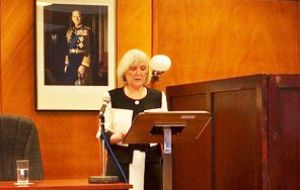 “These are exciting times for the Falkland Islands. The past year has seen significant developments in many areas”, said Acting Governor Sandra Tyler Haywood
“These are exciting times for the Falkland Islands. The past year has seen significant developments in many areas”, said Acting Governor Sandra Tyler Haywood 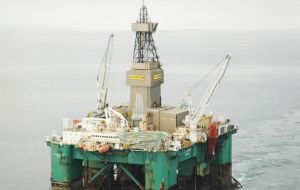 Despite some changes in plans, Premier still estimate that first oil would be produced in 2019
Despite some changes in plans, Premier still estimate that first oil would be produced in 2019 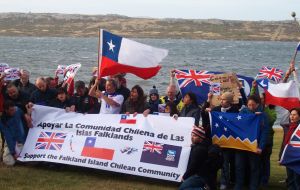 Immigration has been the subject of considerable discussion and debate: it is not possible to grow the economy without an injection of labor
Immigration has been the subject of considerable discussion and debate: it is not possible to grow the economy without an injection of labor 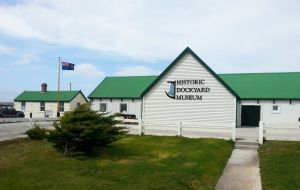 The Historic Dockyard Museum success was confirmed with nomination in the 'International' category of 2015 Museums and Heritage Awards for Excellence”
The Historic Dockyard Museum success was confirmed with nomination in the 'International' category of 2015 Museums and Heritage Awards for Excellence”  Wool core testing was at the highest levels yet and the results indicate the steady progression towards a finer, more valuable, Falkland Island wool clip.
Wool core testing was at the highest levels yet and the results indicate the steady progression towards a finer, more valuable, Falkland Island wool clip. 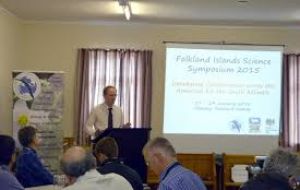 One of the SAERI highlights of the year was the PAN American Science Symposium with delegates representing seven countries from the Americas
One of the SAERI highlights of the year was the PAN American Science Symposium with delegates representing seven countries from the Americas Falkland Islands' Her Honour the Acting Governor delivered on Tuesday his State of the Nation speech to the elected Legislative Assembly underlining progress and expansion achieved in the economy and community development, the UK resolute in defending the rights and wishes of the Falkland Islanders to develop their own natural resources, and despite Argentine disruption and blockade efforts, first oil is expected to be produced in 2019.
However success does not come alone and Acting Governor Sandra Tyler-Haywood said that as the Falklands' economy grows, challenges arise and the availability of workers is a concern plus the fact that the local population is essentially static and ageing, even when the number of children is increasing.
“The Falkland Islands Government must prepare to respond to these demographic changes in coming years”, said Acting Governor Sandra Tyler Haywood and a Population Growth Strategy that addresses immigration is fundamental.
Success with the South Atlantic Environmental Research Institute (SAERI) as a place for a research in the Falkland Islands and wider South Atlantic was also pointed out in the speech.
In effect during 2014/15 SAERI attracted substantial academic grants and consultancy work and formed strong relationships with Universities and Institutes in the US, UK, Asia and Europe, with some of them establishing research programs in the Falkland Islands and South Georgia.
One of the highlights of the year was the PAN American Science Symposium. Delegates representing seven countries participated in an immersive scientific visit to the Falklands with nine senior researchers, from the US, Canada, Chile, Brazil, Colombia and Mexico coming to the Falklands in January 2015.
Pointing out to “a unique international dimension that unfortunately cannot be ignored” the governor said that the hydrocarbons' industry continues to develop at pace, --with the two latest oil discoveries (Zebedee and Isobel Deep)--, despite Argentine efforts to disrupt activity and threaten legal action against participants. Nevertheless “Premier still estimate that first oil would be produced in 2019”.
The disruption efforts have proven ineffective, and “the Government of the UK continues to be resolute in defending the rights and wishes of the Falkland Islanders to develop their own natural resources and ensure that legitimate economic activity in Falkland Islands' waters continues unhindered”.
“Such attempts are inconvenient and frustrating but our focus must remain on our own objectives and we should not be diverted by baseless attempts to derail us. We will continue to concentrate on our own development agenda, in all areas”.
In effect as a result of continuing positive action by MLA’s and local people, supported by the British Government resolve, “the profile of the Falkland Islands remains high in the international community and international interest in the Islands continues unabated”.
Further on Acting Governor Tyler-Haywood also recalled that 2015 is the 800th Anniversary of one of the most important legal documents in the world: Magna Carta, and in line with that event, the Falklands has undertaken a long planned program for law revision, including the appointment of the new Law Commissioner.
Follows the text of the speech:
Mr. Speaker, these are exciting times for the Falkland Islands. The past year has seen significant developments in many areas. Opportunities have arisen for progress and expansion. As a result we have had many challenges to face. In this address I will outline some of them and I will set out how the Government responded to them. I will also outline its aims and aspirations for the coming year.
The concept of an Islands Plan was developed some years ago. However, the current Legislative Assembly extended the philosophy and adopted a Plan which was deliberately intended to be a manifesto of its aspirations and intentions. It gives detail of the Government’s focus on environmental protection, coupled with development of the community, economy and workforce. Economic development and continued financial self-sufficiency are a clear aim of the plan and to this end detail is provided on the Government’s intentions regarding the key industries in the Islands. As a consequence, considerable work is ongoing in the areas of Fisheries, Agriculture, Tourism and Hydrocarbons. I shall cover these in more depth later in this address. The Islands Plan can be seen as a Government template for progress in the coming years.
In terms of the existing key industries, Farmers had a welcome summer, with warmth and rainfall allowing for particularly good grass growth. Partly as a result of this, and combined with efforts by both the Department of Agriculture and FIMCo embraced by the farming community, the quality of all animals, especially lambs, offered for processing was excellent. Wool core testing was at the highest levels yet and the results indicate the steady progression towards a finer, more valuable, Falkland Island wool clip. Both these export industries reflect the successful investment by farmers, with the support of the Farm Improvement Program, in dual purpose sheep genetics. On the domestic meat market the quality and quantity of beef animals also continues to grow.
Tourism is an increasingly important part of the economy of the Falklands. Cruise ship passenger numbers are steadily increasing once again following the global economic downturn at the beginning of the decade. The Tourist Board, which is now a Statutory Corporation, is leading on the development of a new Tourism Strategy aimed at increasing the number of tourists and transforming the tourism industry. The Historic Dockyard Museum opened on time and under budget in its new location and it has received local and international plaudits for the quality of the exhibits and visitor experience. Indeed this was recognized through its nomination in the 'International' category of the 2015 Museums and Heritage Awards for Excellence. Redevelopment of the public jetty as a gateway from the sea and the improvements along the sea front will continue in support of strategic tourism ambitions and in line with the Waterfront Master plan. The potential for an additional air link and increased accommodation capacity will also continue to be pursued since these are vital for further expansion.
The Hydrocarbons industry continues to develop at pace despite Argentine efforts to disrupt activity and threaten legal action against participants. These efforts have proven ineffective, and the Government of the United Kingdom continues to be resolute in defending the rights and wishes of the Falkland Islanders to develop their own natural resources and ensure that legitimate economic activity in Falkland Islands' waters continues unhindered.
In November last year, Premier Oil announced significant changes to their plan for the development of the Sea Lion oilfield. The project had previously been defined on the basis of a large tension-leg platform (or TLP). The revised scheme is redefined as a leased FPSO development which creates a more easily deliverable scheme at a substantially reduced cost. The project sanction decision is expected in 2016, and Premier still estimate that first oil would be produced in 2019.
From that point onwards, activity visibly increased in Stanley as various streams of activity ramped up in preparation for the exploration drilling campaign. Large volumes of oilfield equipment flowed ashore, with a number of chartered cargo vessels docking in Stanley through late 2014 and early 2015. A chartered tug was positioned in Stanley to assist with berthing operations, and significant investment continues to be made by local businesses in acquiring new equipment and developing additional facilities to service the logistical requirements of the oilfield activity. Three helicopters arrived to support the exploration work, and a temporary hotel facility was imported and set up in early 2015 to provide additional accommodation.
The latest exploration drilling commenced in early March with Premier Oil drilling the first planned well on the Zebedee prospect. The well completed successfully, and was declared an oil and gas discovery by the operator on 2nd April. The additional resources identified in this well will increase the existing proven resource and form part of future development of the subsequent phases of the Sea Lion oilfield.
Following this, the second well of the program, Isobel Deep, was also declared and oil discovery on 28th May. Resources in this prospect will require further appraisal, but could form part of a later phase of production. The rig moves to Noble Energy for their well in the licence area to the south-east of the Falkland Islands in early June, before returning to Premier to complete the undrilled section of the Jayne East and Chatham wells. On completion of the requisite regulatory approvals, it is expected to complete the six well drilling campaign by drilling a well for Noble on the Rhea prospect in the former Argos Resources acreage.
The impact that hydrocarbons may have on the Islands is, of course, of paramount importance. The abundance of wildlife, the pristine nature of the Islands and the way of life of the Islanders are always uppermost in our minds. The Government's Hydrocarbon Development Policy Statement, which sets out a broad policy framework for the future development of the industry is designed to ensure that such development is responsible and carefully planned. Relevant legislation has been reviewed and new and amended legislation is in the pipeline. The legislative side of the Tax Review is almost complete and new, much needed, maritime legislation is being developed. Planning, in all areas is progressing well and industry specialists have been commissioned to guide and assist us in the process.
The Government worked with the private sector to define a 'Local Content Policy' that will encourage and maximize opportunities for local businesses to work with the oil industry. The prospect of oil provides a real opportunity to boost the economic prosperity of the Islands and this opportunity must be grasped if we are to play a full part in our long-term economic development. The policy was formally launched earlier this year and the first applications have been accepted by the Local Content Board.
The current financial year is once again looking healthy for fishery finances. As a measure of GDP, fishing remains the most important industry in the Falkland Islands. 2014 was a record year for the Illex squid fishery. However, the 2015 Illex season has now surpassed even that with a new record at 353,000 tons. However, the success of our fishery is not judged by catch sizes alone. Despite the fact that our neighbors unilaterally withdrew from all aspects of joint management of the South Atlantic fishery, the Falkland Islands fisheries' scientists continuously monitor fish stocks and associated environmental factors. As a result, the Falkland Islands fishery continues to be widely regarded as one of the best-managed fisheries in the world.
Notwithstanding our excellent stewardship of the Falkland Islands fishery, the number of deaths and serious accidents amongst fishermen, particularly in the jigging fleet, remains unacceptable. Work is ongoing to put procedures and protocols in place to reduce such incidents and improve the welfare and protection of fishermen. Work also continues on modernizing the fishing licence regime. A review of the Individual Transferable Quota (ITQ) system has been completed with largely positive findings. During the coming months, the recommendations will be implemented and further work undertaken to make improvements to the system. In addition, resources will be made available to update marine legislation and administration in recognition of the fact that maritime industries are vital sectors of the Falklands economy.
Since it was established in 2012, The South Atlantic Environmental Research Institute (SAERI) has continued to grow quickly; validating that there is a place for a research institute in the Falkland Islands and wider South Atlantic. In 2014/15 SAERI has been successful in attracting substantial academic grants and consultancy work. It has also formed strong relationships with Universities and Institutes in the US, UK, Asia and Europe. A number of these have established research programs in the Falkland Islands and South Georgia with SAERI.
One of the highlights of the year was the PAN American Science Symposium. Delegates representing seven countries participated in an immersive scientific visit to the Falklands. Nine senior researchers, from the US, Canada, Chile, Brazil, Colombia and Mexico came to the Falkland Islands in January 2015. A range of fields were represented, including marine biology, climate science, botany and geology. A representative from National Geographic, and three filmmakers from Uruguay documented this landmark visit. The symposium significantly raised the profile of the Falklands as a destination that presents wide-ranging prospects for collaborative research, and on all measures this scientific exchange has been a resounding success by the Falkland Islands Government and SAERI.
Government finances have once again been bolstered by increased economic activity, allowing surpluses to be targeted towards Island Plan priorities. FIG remains committed to responsible management of the Government budget and these higher reserves provide security and avoid potentially unsustainable future deficits. Also, a number of infrastructure projects can now be progressed and high standards of service provision can be maintained and enhanced.
The Budget Strategy for the 5 year Medium Term Financial Plan will be presented to the House this morning, outlining Government investments and the mechanisms to deliver this. Higher reserves will also enable FIG to support economic development through a Local Investment Strategy managed through FIDC making an element of the Government’s uncommitted reserves available to local businesses.
The provision of effective, efficient and affordable healthcare is a prime responsibility of any modern Government. Patients have ever-increasing expectations. Improvements in clinical standards, technological advances and increasing clinical specialization all combine to compound the challenge. The Medical Services Department has reorganized how primary care appointments can be offered to the community and have within resources, increased accessibility and facilities since last year. KEMH has also now set up clinics to support people with long term conditions. These will offer considerable advantages for people to make good decisions in their given circumstances and support them to live well. An important aspect of this initiative will be prevention as well as support. In addition, a substantial investment of capital funding in the KEMH is planned to update and replace systems and machinery. This will ensure the continued safe running of the infrastructure for medical services. A review is also underway to look at the use of space at the hospital in the light of new demands and developments.
An agreed process has also been established to progress Older People's services to deliver a Falklands preferred model. This will not just deliver a building, but also a range of community support services to ensure that people’s independence in their own homes can be maximized and that more expensive, institutional forms of care do not become necessary too early due to lack of a preventive approach.
Social Services now encompasses Children’s services, Adult services and the Probation service. Demands for all branches have increased markedly and staff manage referrals and necessary development work within their available resources. The action plan arising from the original Lucy Faithfull review has been substantially completed and we invited the same organization to re-inspect to gain an objective view on progress and other related issues. This second review took place in March 2015 and it is reassuring to see that their view is that the vital provision of cross agency safeguarding for children has been largely achieved with credit going to all staff concerned in achieving a major transformation. This review has been agreed for publication.
Community Safety is and always will be a priority for the Government. When HMP Stanley opened in 2009 it was believed it would be fit for purpose for the foreseeable future. However, as a result of proactive action by the police and prosecutors, some lengthy custodial sentences have been imposed. As a result, the prison regime has developed and a culture where appropriate educational, rehabilitation, and resettlement programs are seen as essential parts of a person's term of imprisonment has been introduced. An extension to the prison is underway and a dedicated team of Prison Officers, led by an experienced Prison Manager has been recruited to achieve this change.
Turning to Education, it is pleasing to note that both schools recorded a step increase in performance and standards since the last school inspections. Action plans continue to support the schools on their journey to excellence. Numbers of children on roll is growing steadily and a new building will provide much needed space for the youngest children for next year. The schools recognize that teacher recruitment is a future challenge and this reflects worldwide trends. The partnership with LEAD Academy offers opportunities to help us meet this challenge. Partnerships are also developing to enhance the training offered and facilitated by the Training Centre. Alongside this, in order to promote industrial development, the Training Centre aims to facilitate opportunities in new areas of learning. Stanley House received a special mention in the last inspection report for their excellent Safeguarding Systems and Training procedures. Once again a high proportion of students have accessed Further and Higher Education. The Education team are building new links with colleges nationally and internationally to support access to Education in a global market.
The Falkland Islands will no doubt continue to face difficult challenges in the immediate and longer terms. The population is essentially static and ageing yet the number of children in the Islands increasing. The availability of workers is a concern, at a time when the employment market is under pressure from economic growth and new industries. There will also be potential care issues for the future. FIG must prepare to respond to these demographic changes in the coming years.
In order to do so, it is vital that our strong economy is maintained. Whilst the potential economic benefits that would come with oil production would be welcome, planning for the economy cannot rely on this.
The Economic Development Strategy, or EDS, which was produced in partnership with local businesses, was designed as a roadmap to help in developing the economy. It includes measures to develop existing industries such as fisheries, agriculture and tourism but also includes options for diversification into new sectors and for improving the general economic environment. Since it is some time since the Strategy was originally developed, it will be reviewed in the coming year once the new Head of Policy is in post, to ensure it remains relevant and fit for purpose.
The challenges we face are compounded by having to deal with continued attempts by the Government of Argentina to stifle our economy and block our economic development. However, we are confident that these attempts will continue to fail as we have the full backing of the UK Government and international law. Such attempts are inconvenient and frustrating but our focus must remain on our own objectives and we should not be diverted by baseless attempts to derail us. We will continue to concentrate on our own development agenda, in all areas.
In addition to the headline services already mentioned, the Government has a number of other priorities for the coming months.
Immigration has been the subject of considerable discussion and debate in recent years. It will not be possible to grow the economy without an injection of labor and fundamental to this is the formulation of a Population Growth Strategy. It is important that we get Immigration Policy right, particularly at a time when the emerging hydrocarbons industry is still at an embryonic stage. Following the independent Review of Immigration and consultation exercise conducted last year, review and policy formulation is currently being progressed by an overseas advisor and members of the Immigration Review Group. It is anticipated that the principal aspects of this work and the preparation of legislative drafting instructions in order for revised legislation to be brought into effect to support revised immigration processes should be completed this year.
Localization of Government jobs (wherever possible and practical) remains a priority. However, it is difficult to progress this without the associated training and experience that will allow people to be appropriately developed. It should be noted that a total of £1.3M is currently included annually in the Government's budget, which demonstrates the Government's commitment to succession planning and developing local talent. However, these funds have traditionally not necessarily been used efficiently or effectively; indeed there have been considerable under-spends in recent years. Therefore, a comprehensive Training Needs Analysis was undertaken recently and the results will be made available shortly. The recommendations in this study will be used to improve training at a national level and hence improve local opportunities.
Civil aviation is important to island communities. Regulatory Services will continue to ensure that it provides an effective and, as far as reasonably practical, independent system of aviation safety regulation. It was pleasing recently to see those efforts recognized in a very positive external audit report after the department was assessed by Air Safety Support International in February. These successes are the outcome of the hard work of many people - the farmers from Camp who maintain their airstrips, the team at FIGAS, the contractor that completed the work at the airport and the civil aviation team. An example of what we can achieve when we work together.
A review of the Fuel licensing regime was completed this year which should lead to improvements in service provision. The matter of a new telecoms licence will be addressed together with a new Telecommunications Ordinance this year. The Government intends to ensure improved standards of telecommunications for the Islands. It is anticipated that this will include enhanced international capacity, increased availability of mobile services, better value for money and a more robust telecommunications network.
Transport links will always be an important part of the Islands' infrastructure; both internally and internationally. The Government is investigating the possibility of enhancing air links to improve accessibility and allow tourism and the economy generally to develop. Additional funding has also been included in the budgets for future years for maintenance and improvement of the Islands' road network. In the last 5 years over 53,500 tons of capping has been processed and laid on the MPA road. PWD in conjunction with their 2 haulage contractors are currently laying a further 15,000 tons. The 5 year plan allows for a continual progressive recapping of the MPA road at £400,000 a year. In addition, further sections of the MPA road will be tarmacked in the future as funds allow.
Housing remains a key strategic priority for the Government and there has been further significant progress. On Sapper hill a further phase of housing plots (46 FIG and 24 private sector) has been completed and is already being built upon. This is being followed by a further phase of 80 plots which is scheduled to be completed during 2015/16. At Murray Heights, 57 plots were serviced last year, all have been allocated with the majority having units in place, and plans are also being made for a further site for 20 units.
The utilities infrastructure will also receive attention. The Alternative water supply, from the upper reaches of the Murrell River, which will provide much greater resilience in terms of capacity, is almost completed with approximately 85% of the pipeline and power cable for the pumps laid. The scheme should be operational later this month. There has been some strengthening of staffing of the Power Section, which should assist both with operational needs and with taking forward the outcomes of the Review and Presentation of Options for Power Generation. This will address replacement of the aging generators and infrastructure within the Power Station, and may lead to the development of a new site.
Emergency Planning preparedness continues to receive attention with the FIG Major Incident Plan totally refreshed and modernized. This ongoing preparedness and exercising of the plan will ensure the country has a well practiced process in the event that a natural or man-made disaster ever occurs in the Falkland Islands.
2015 is the 800th Anniversary of one of the most important legal documents in the world –Magna Carta. It is also an important time for Law on the Islands. The long planned program for law revision has commenced with the appointment of the new Law Commissioner and substantial progress should be made in progressing the Revised Laws Project. In addition, in the forthcoming year, as part of a busy timetable, your government has committed to bringing forward key legislation on:
• Improving our tax laws in readiness for the next stage of development of the oil industry
• The revision of maritime and harbors laws; in support of oil readiness program
• The updating of our prisons legislation
• Further improving our laws on animal health; in support of the export of meat;
• Better management of Stanley Common
• Substantial amendment to the Immigration Bill;
• A new Education Bill;
• A review and update of the Election Ordinance to ensure that we continue to demonstrate the highest international standards in our election practices
• A review of the Telecommunications legislation in support of new licensing proposals
• A package of legislation reflecting new offshore petroleum environmental regime;
• A review of the administration of justice ordinance to make amendments to reflect our ambitions for the legal system and the changing legal profession on the islands
• New legislation relating to the regulation of doctors dentist, nurses and midwifes, to facilitate the possibility for private practitioners on the islands
Mr Speaker, once again this is an ambitious legislative program.
Finally, amidst all the day to day work of the Government here in the Islands and the progress we are making in our economy and community development, there is a unique international dimension that unfortunately cannot be ignored. It is not of our making nor is it our desire. Argentina continues to attempt to present historical inaccuracies and spurious sovereignty claims, and to seek to apply Argentine domestic law extra-territorially in a vain attempt at economic blockade. However, as a result of continuing positive action by MLA’s and local people, supported by the British Government’s steadfast resolve, the profile of the Falkland Islands remains high in the international community. Therefore, since international interest in the Islands continues unabated, we have:
• Welcomed a number of key politicians, opinion formers and journalists, particularly from Latin America;
• Hosted advisers from overseas embassies aimed at developing overseas exports for Falklands goods
• hosted a group of business specialists with expertise in personnel training and development for the hydrocarbons industry. This relationship continues to grow
• Continued with our global public diplomacy strategy, which increasingly involves members of the local community, at home and abroad; and
As a result we will continue to promote a clear and unequivocal message about who we are to the international community in general and to our South American neighbors in particular.
Mr Speaker, the people of the Falkland Islands have been meeting challenges head on for nearly two hundred years. We have done so with pride and resilience. We are practical and inventive people who develop appropriate local solutions, even when the task seems impossible. We stand up for ourselves and are steadfast in our resolve. As a result, the community has modern expectations and modern ambitions. The Government of the Falkland Islands has high standards, high moral obligations and strives to provide first class services. Therefore, despite the many serious challenges which lie ahead, the Government will continue to ensure that the Islands have the bright future that they deserve.




Top Comments
Disclaimer & comment rules-

-

-

Read all commentsExcellent presentation and a role model for ideal governance. Democracy at its ideal.
Jun 03rd, 2015 - 09:58 am 0Just for a moment: Compare that with what would have happened if Argentina had not been expelled in 1982...
A chilling thought.
”The disruption efforts have proven ineffective, and “the Government of the UK continues to be resolute in defending the rights and wishes of the Falkland Islanders to develop their own natural resources and ensure that legitimate economic activity in Falkland Islands' waters continues unhindered”.
Jun 03rd, 2015 - 01:43 pm 0Just like everything else TMBOA tries to do, she FAILS! Bunch of nobodies trying to steal the Falklands (there are NO Malvinas you twats).
@2. Amazing that the broken, incompetent, financially-failed United Kingdom (according to the trolls) can still assist its BOT citizens to continue their lives without significant hindrance.
Jun 03rd, 2015 - 02:43 pm 0We all work together. The Islanders, British citizens, the British government, the Falkland Islands Defence Force, Royal Navy, Royal Air Force, British Army. United against the declared enemy. As THE man said “We shall never surrender”.
Commenting for this story is now closed.
If you have a Facebook account, become a fan and comment on our Facebook Page!